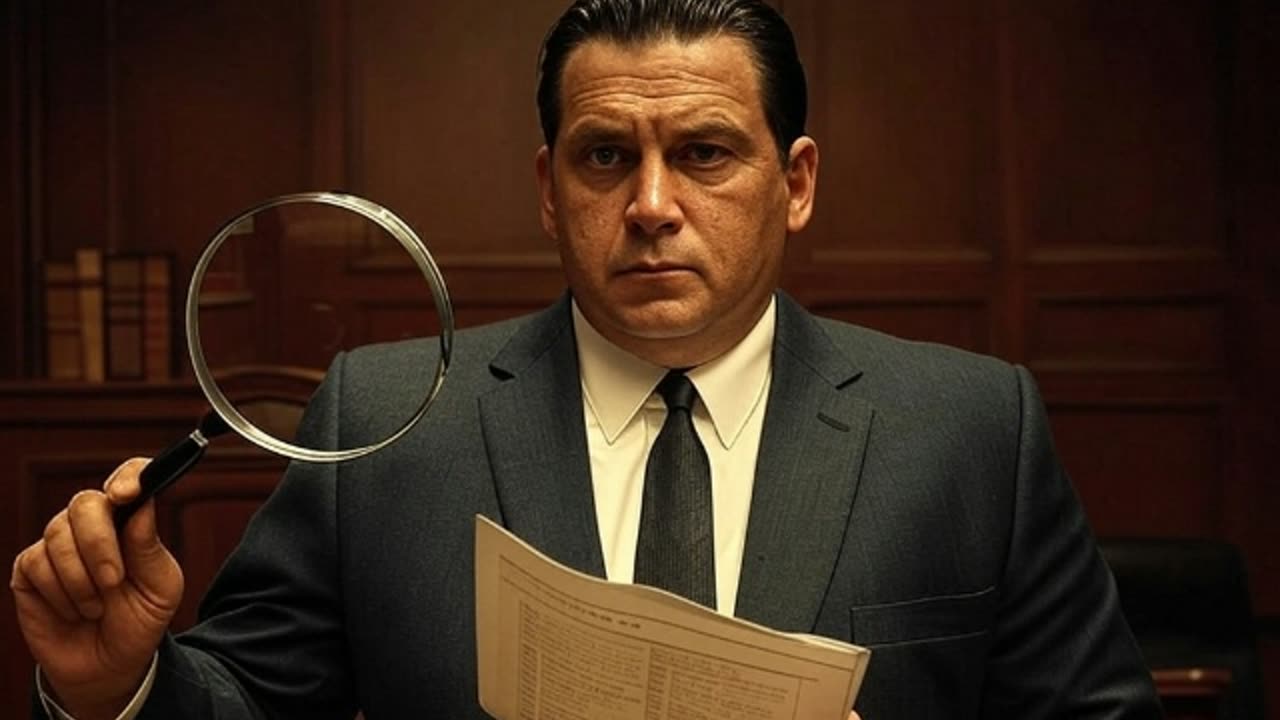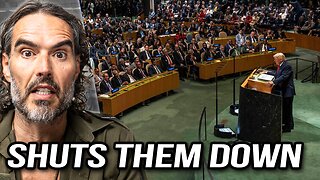Premium Only Content

Mr. District Attorney: The $100,000 Dollar Check (June 13, 1939)
Setting: A contemporary (1939) American city, likely modeled on New York, with scenes in the District Attorney’s office, upscale banks, city streets, and possibly a luxurious estate or shady hideout. The episode uses sound effects like typewriters, footsteps, rustling paper, and slamming doors to create a tense, urban atmosphere, reflecting the high-stakes world of financial crime.
Plot:
Introduction: The episode opens with a dramatic orchestral theme, followed by an announcer (likely Mark Hawley) introducing Mr. District Attorney as a series about a relentless prosecutor fighting crime. The narrator sets the stage for “The $100,000 Dollar Check,” a case involving a fraudulent financial scheme that threatens the city’s economic stability.
The Crime: The story begins with the discovery of a forged or fraudulent $100,000 check, a massive sum in 1939, tied to a sophisticated criminal operation. The check might be used to swindle a bank, extort a wealthy individual, or fund an illegal enterprise, such as a racketeering syndicate. The perpetrator, possibly a suave con artist or a corrupt financier, has left a trail of deception, prompting the District Attorney’s office to intervene. The crime’s audacity, given the check’s enormous value, escalates the case to a priority, with potential victims including prominent citizens or institutions.
The Investigation: The District Attorney, referred to as “Chief” or “Mister District Attorney” (voiced by Raymond Edward Johnson), launches a meticulous investigation, assisted by his secretary, Edith Miller. The probe focuses on tracing the check’s origins, examining bank records, and interviewing suspects, such as bank tellers, forgers, or high-society figures. The episode highlights the series’ emphasis on legal and investigative tactics, with the DA employing strategies like undercover inquiries or forensic analysis of the check’s ink or signature. Obstacles include false alibis, bribed witnesses, or the perpetrator’s ability to manipulate financial systems, reflecting 1930s concerns about white-collar crime.
Pursuing the Criminal: The investigation leads to a key suspect, possibly a charismatic mastermind or a desperate businessman, whose identity is uncovered through a paper trail or a slip-up during interrogation. The pursuit might take the DA to a ritzy penthouse, a backroom gambling den, or a rural safehouse, with action sequences involving stakeouts or confrontations. Sound effects like screeching tires, clinking glasses, or a safe cracking add tension. Miller likely plays a crucial role, perhaps decoding financial documents or posing as a potential victim to draw out the suspect, showcasing her intelligence and resourcefulness.
Climax and Resolution: The climax likely occurs in a courtroom or during a dramatic arrest, where the District Attorney exposes the perpetrator’s scheme through compelling evidence—perhaps a recovered ledger, a witness’s testimony, or the forged check itself. The criminal is convicted, facing prison for fraud, forgery, or related charges, reinforcing the show’s message that “crime does not pay.” The episode closes with the announcer reflecting on the victory of justice, emphasizing the DA’s role as a guardian of public trust, and teasing the next case with a call to tune in.
Themes: The dangers of financial greed, the power of legal accountability, and the fight against sophisticated crime. The episode reflects 1939’s fascination with economic scams, echoing real-life concerns about post-Depression financial instability and the need for law enforcement to protect society.
Cast and Roles:
District Attorney (“Chief”): Played by Raymond Edward Johnson, delivering a commanding, righteous performance as the unnamed prosecutor, with a clear, authoritative voice conveying determination and moral conviction.
Edith Miller: Played by an unnamed actress, possibly Vicki Vola (who later became prominent in the role), portraying the DA’s intelligent, loyal secretary with poise and sharpness, assisting with research or undercover work.
The Perpetrator: Played by an unnamed actor, likely a radio veteran, voicing a cunning con artist or financier with a smooth, manipulative tone, exuding confidence and deceit.
Supporting Characters: An ensemble of unnamed actors, including:
Bank Officials: Voiced as nervous or complicit figures providing clues or obstacles.
Witnesses/Informants: Victims, accountants, or low-level crooks, voiced with fear or cunning, offering key testimony.
Minor Roles: Police officers, court clerks, or henchmen, adding depth to the financial and legal world.
Announcer: Likely Mark Hawley or an NBC host, delivering the opening and closing narrations with a dramatic, urgent tone, framing the episode’s stakes and moral lesson.
Note on Cast: Mr. District Attorney relied on a skilled radio cast, with Johnson as the anchor, supported by actors doubling in minor roles. Performances balanced drama with realism, aligning with Byron’s vision of authenticity.
Production Details:
Music: A dramatic orchestral theme, likely composed by NBC’s in-house musicians, opens and closes the episode, with suspenseful stings accentuating investigative or courtroom scenes. The music heightens the crime drama’s intensity.
Writer/Director: Ed Byron, drawing on his legal expertise and Dewey’s anti-crime legacy, crafting a story inspired by real financial fraud cases, tailored for radio’s fast-paced narrative.
Sound Effects: Essential to the episode, including typewriters, footsteps, rustling paper, slamming doors, and possibly bank vault clicks or car engines, creating a vivid urban and financial atmosphere. The check’s handling might feature subtle sounds like paper crinkling.
Sponsor: Unsponsored in its early run, Mr. District Attorney was supported by NBC, with no commercial breaks noted in this episode, allowing a focused 30-minute story.
World and National Events Around June 13, 1939:
To provide context for the broadcast, here are key world and national events occurring in June 1939, reflecting the pre-war climate that shaped listeners’ perspectives:
World Events:
Nazi Germany’s Aggression: Germany, under Hitler, continued its expansionist policies after occupying Czechoslovakia (March 1939) and annexing Memel (Klaipėda) from Lithuania. By June, tensions over Poland escalated, with Britain and France pledging support against German aggression, a topic dominating radio news and foreshadowing World War II (began September 1, 1939).
Italian Fascism: Mussolini’s Italy, having invaded Albania (April 7, 1939), strengthened its Axis alliance with Germany via the Pact of Steel (May 22, 1939). U.S. radio reported Italy’s actions, resonating with the episode’s theme of combating organized crime, akin to earlier episodes like “The Milano Brothers.”
Japanese Expansion: Japan’s invasion of China persisted, with the Battle of Nanchang (March–May 1939) securing Japanese gains. U.S. media covered concerns about Pacific stability, amplifying anti-Axis sentiment and calls for moral leadership, aligning with the episode’s focus on justice.
Holocaust Intensifying: Nazi anti-Jewish policies worsened, with forced emigration, property seizures, and early concentration camp expansions (e.g., Dachau). Limited U.S. awareness through radio and newspapers sparked debates over refugee policies, echoing the episode’s moral undertones.
National Events:
Economic Recovery: The U.S. was recovering from the Great Depression, with unemployment at 17% but improving due to New Deal programs. The Fair Labor Standards Act (1938) enforced a 25-cent minimum wage and 44-hour workweek, boosting economic optimism, covered in radio news.
Roosevelt’s Neutrality: President Franklin D. Roosevelt maintained U.S. neutrality amid global conflicts, while increasing defense spending and aiding Allies via cash-and-carry policies. Radio addresses emphasized democratic values, aligning with the episode’s portrayal of the DA as a defender of public trust.
Entertainment and Morale: Hollywood and radio thrived, with films like The Wizard of Oz (in production, released August 1939) and radio shows like The Shadow dominating. Mr. District Attorney capitalized on fascination with crime dramas, inspired by real mob crackdowns.
Sports and Culture: The 1939 MLB season saw the New York Yankees leading, with Lou Gehrig’s retirement (June 1939) due to ALS making headlines. Benny Goodman’s swing music, like “And the Angels Sing,” defined the era’s vibrant culture, covered on radio.
Cultural Context: Aired in the tense summer of 1939, “The $100,000 Dollar Check” resonated with American listeners by portraying the District Attorney as a heroic figure battling sophisticated financial crime, mirroring public concerns about economic stability and trust in institutions post-Depression. The episode’s focus on fraud reflected 1930s anxieties about white-collar crime, seen in news of bank scandals and Ponzi schemes, while its legal realism offered a grounded contrast to sensational radio dramas like The Shadow. Airing Tuesday nights (based on scheduling patterns), Mr. District Attorney
-
 1:00:24
1:00:24
Jeff Ahern
5 hours ago $4.36 earnedThe Sunday Show with Jeff Ahern
25.3K13 -
 LIVE
LIVE
OhHiMark1776
2 hours ago🟢 09-28-25 ||||| Act 3 Continue ||||| Baldur's Gate 3 (2023)
74 watching -
 2:04:33
2:04:33
DooM49
3 hours ago12 Days until Battlefield 6
10K1 -
 17:23
17:23
Russell Brand
2 days agoThey couldn't handle this...
128K321 -
 18:18
18:18
DeVory Darkins
22 hours ago $37.90 earnedPortland gets NIGHTMARE NEWS as Trump orders Troops to crush violent rioters
67.6K350 -
 1:32:21
1:32:21
JTtheSG
3 hours agoLIVE Replay - Ready To Play VOID BREAKER
6.66K -
 4:43:17
4:43:17
DoldrumDan
6 hours agoNEW STREAM SCHEDULE 3PM EST TO 7PM EST EVERY DAY
28K5 -
 3:45:41
3:45:41
Sgt Wilky Plays
4 hours agoSunday Finals | Regiment Donor Drive
15.9K1 -
 LIVE
LIVE
Ouhel
6 hours agoSUNDAY | Active Matter | Exploring the postapocalyptic | O'HELL LIVE
55 watching -
 LIVE
LIVE
Astral Doge Plays!
7 hours agoFinal Fantasy IX ~LIVE!~ Iifa Tree Visitation Hours
30 watching